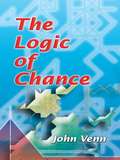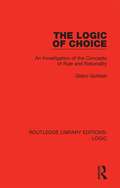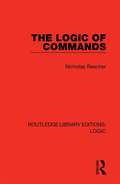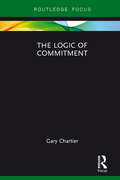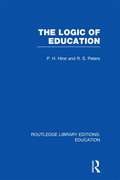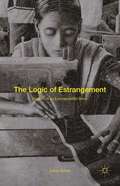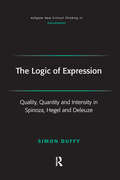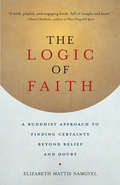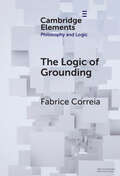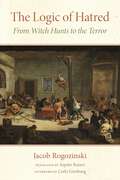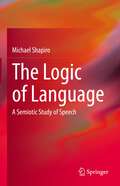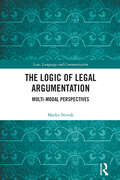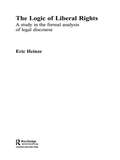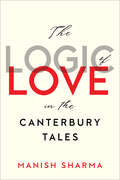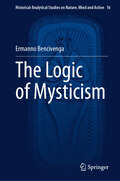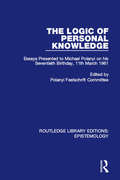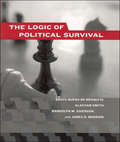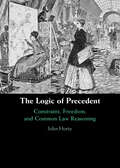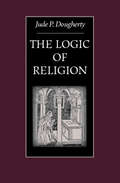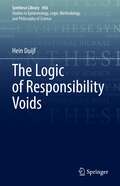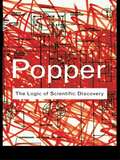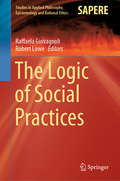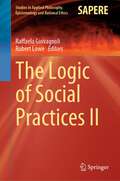- Table View
- List View
The Logic in Philosophy of Science
by Hans HalvorsonMajor figures of twentieth-century philosophy were enthralled by the revolution in formal logic, and many of their arguments are based on novel mathematical discoveries. Hilary Putnam claimed that the Löwenheim-Skølem theorem refutes the existence of an objective, observer-independent world; Bas van Fraassen claimed that arguments against empiricism in philosophy of science are ineffective against a semantic approach to scientific theories; W. V. O. Quine claimed that the distinction between analytic and synthetic truths is trivialized by the fact that any theory can be reduced to one in which all truths are analytic. This book dissects these and other arguments through in-depth investigation of the mathematical facts undergirding them. It presents a systematic, mathematically rigorous account of the key notions arising from such debates, including theory, equivalence, translation, reduction, and model. The result is a far-reaching reconceptualization of the role of formal methods in answering philosophical questions.
The Logic of Chance: An Essay On The Foundations And Province Of The Theory Of Probability, With Especial Reference To Its Logical Bearings And Its Ap (Dover Books on Mathematics)
by John VennNo mathematical background is necessary to appreciate this classic of probability theory, which remains unsurpassed in its clarity, readability, and sheer charm. Its author, British logician John Venn (1834-1923), popularized the famous Venn Diagrams that are commonly used for teaching elementary mathematics. In The Logic of Chance, he employs the same directness that makes his diagrams so effective.The three-part treatment commences with an overview of the physical foundations of the science of probability, including surveys of the arrangement and formation of the series of probability; the origin or process of causation of the series; how to discover and prove the series; and the conception of randomness. The second part examines the logical superstructure on the basis of physical foundations, encompassing the measurement of belief; the rules of inference in probability; the rule of succession; induction; chance, causation, and design; material and formal logic; modality; and fallacies. The final section explores various applications of the theory of probability, including such intriguing aspects as insurance and gambling, the credibility of extraordinary stories, and approximating the truth by means of the theory of averages.
The Logic of Choice: An Investigation of the Concepts of Rule and Rationality (Routledge Library Editions: Logic)
by Gidon GottliebOriginally published in 1968. This is a critical study of the concept of ‘rule’ featuring in law, ethics and much philosophical analysis which the author uses to investigate the concept of ‘rationality’. The author indicates in what manner the modes of reasoning involved in reliance upon rules are unique and in what fashion they provide an alternative both to the modes of logico-mathematical reasoning and to the modes of scientific reasoning. This prepares the groundwork for a methodology meeting the requirements of the fields using rules such as law and ethics which could be significant for communications theory and the use of computers in normative fields. Other substantive issues related to the mainstream of legal philosophy are discussed - theories of interpretation, the notion of purpose and the requirements of principled decision-making. The book utilizes examples drawn from English and American legal decisions to suggest how the positions of legal positivism and of natural law are equally artificial and misleading.
The Logic of Commands (Routledge Library Editions: Logic)
by Nicholas RescherOriginally published in 1966. Professor Rescher’s aim is to develop a "logic of commands" in exactly the same general way which standard logic has already developed a "logic of truth-functional statement compounds" or a "logic of quantifiers". The object is to present a tolerably accurate and precise account of the logically relevant facets of a command, to study the nature of "inference" in reasonings involving commands, and above all to establish a viable concept of validity in command inference, so that the logical relationships among commands can be studied with something of the rigour to which one is accustomed in other branches of logic.
The Logic of Commitment (Routledge Focus on Philosophy)
by Gary ChartierThis book develops and defends a conception of commitment and explores its limits. Gary Chartier shows how commitment serves to resolve conflicts between ordinary moral intuitions and the reality that the basic aspects of human well-being are incommensurable. He outlines a variety of overlapping and mutually reinforcing rationales for making commitments, explores the relationship between commitment and vocation and the relevance of commitment to love, and notes some reasons why it might make sense to disregard one’s commitments. The Logic of Commitment will appeal to ethicists interested in the connection between commitment and personal well-being, and to anyone who wonders why and when it might make sense to make or keep commitments.
The Logic of Education (Routledge Library Editions: Education)
by P. H. Hirst and R. S. PetersThis book explores the implications for the curriculum, for teaching and for the authority structure of schools and colleges of an analysis of ‘education’ in which the development of knowledge and understanding is accorded a central position. The book explains what philosophy of education is, and by concentrating on its central concepts, initiates readers into exploring it for themselves. It also serves as a succinct introduction to the growing literature on philosophy of education in the UK.
The Logic of Estrangement: Reason in an Unreasonable Form
by Julius SensatThe book recasts the concept of estrangement as 'reason in an unreasonable form', traces its development in writings of Kant, Hegel, and Marx, supplies a game-theoretic reconstruction of it, and assesses its significance for a critical understanding of John Rawls's philosophy.
The Logic of Expression: Quality, Quantity and Intensity in Spinoza, Hegel and Deleuze (Ashgate New Critical Thinking in Philosophy)
by Simon DuffyEngaging with the challenging and controversial reading of Spinoza presented by Gilles Deleuze in Expressionism in Philosophy (1968), this book focuses on Deleuze's redeployment of Spinozist concepts within the context of his own philosophical project of constructing a philosophy of difference as an alternative to the Hegelian dialectical philosophy. Duffy demonstrates that a thorough understanding of Deleuze's Spinozism is necessary in order to fully engage with Deleuze's philosophy of difference.
The Logic of Faith: A Buddhist Approach To Finding Certainty Beyond Belief And Doubt
by Elizabeth Mattis NamgyelA popular American Buddhist teacher explores the creative relationship between faith and doubt, knowing and not-knowing, and shows how an awakened life results from living from the place in between.Faith is a thorny subject these days. Its negative expressions cause many to dismiss it out of hand--but Elizabeth Mattis Namgyel urges us to reconsider, for faith is really nothing but our natural proclivity to find certainty in a world where certainty is hard to come by. And if we look carefully, we’ll discover that the faith impulse isn’t separate from reason at all—faith and logic in fact work together in a playful and dynamic relationship that reveals the profoundest kind of truth—a truth beyond the limits of “is” and “is not.” Using the traditional Buddhist teachings on dependent arising, Elizabeth leads us on an experiential journey to discover the essential interdependence of everything--and through that thrilling discovery to open ourselves to the whole wonderful range of human experience.
The Logic of Grounding (Elements in Philosophy and Logic)
by Fabrice CorreiaThe concept of grounding – of a fact obtaining in virtue of other facts – has been a topic of intensive philosophical and logical investigation over roughly the past two decades. Many philosophers take grounding to deserve a central place in metaphysical theorizing, in great part because it is thought to do a better job than other concepts – e.g., reduction and supervenience – at capturing certain phenomena. Studies on the logic of grounding have largely been conducted with this philosophical background in mind. In this Element, I try to give a faithful picture of the contemporary development of the logic of grounding in a way that is both reasonably comprehensive and reasonably systematic.
The Logic of Hatred: From Witch Hunts to the Terror
by Jacob RogozinskiThis book works to uncover the logic of hatred, to understand how this affect manifests itself historically in persecution and terror apparatuses. More than a historical genealogy of persecution, The Logic of Hatred shows what phenomenology can offer to historical understanding. Focusing on the witch-hunts waged in the fifteenth through seventeenth centuries, the first part of the book analyzes the techniques instigators used to designate and annihilate their targets: the search for diabolical stigma, the confession of “truth” extracted by torture, the constitution of an absolute Enemy through the suggestion of conspiracy, of a world turned upside-down, or the figure of Satan.Rogozinski locates one of the origins of the witch-hunt in the anguish that popular uprisings arouse in dominant classes. The second part of the book extends the investigation to related phenomena, such as the extermination of lepers in the Middle Ages and the Reign of Terror during the French Revolution. By studying these historical experiences and marking their differences and similarities, this book shows the passage from exclusion to persecution and how revolts of the oppressed can let themselves be transformed and captured by persecutory politics. The analyses presented thus shed light on conspiracy theory and the terror apparatuses of our time.
The Logic of Language: A Semiotic Study of Speech
by Michael ShapiroThis book serves as a basis for the exploration of language in a more systematic way. By surveying the several major divisions of language (phonology, morphology, syntax, lexis, tropology) and explicating the way in which sound and meaning cohere in them, this text lays bare––for students, scholars and advanced readers alike––the lineaments of an understanding of what makes language the sign system par excellence, in the service of its most important function as the instrument of cognition and of communication. This book is intended as a companion volume to Shapiro’s The Speaking Self: Language Lore and English Usage. The two volumes taken in tandem will provide a solid grounding in the observational science of linguistics, linking theory with practice in a way that will expand one’s understanding of language as a global phenomenon.
The Logic of Legal Argumentation: Multi-Modal Perspectives (Law, Language and Communication)
by Marko NovakMulti-modal argumentation with its logical, emotional, visceral and kisceral arguments is an important addition to logical argumentation, especially when real-life situations are considered. It does not discard logic but adds other modes of argumentation to complement it, to emphasize the realistic environments of communication. In this sense, the multi-modal theory is important for the area of legal argumentation, where even in the reasoning of judicial decisions traces of a flesh-and-blood personality, who decided the case and wrote the reasons, can be found. This book presents a comprehensive analysis of this informal logic in legal argumentation and its practicality within the law. It argues that by building on the dialectical and rhetorical models of legal argument, the former being important for clear cases while the latter for unclear ones, the multi-modal theory of legal argumentation brings together logic and psychology in a holistic or integral perspective. The approach is not only descriptive, identifying the traces of alternate arguments in judicial decisions, but is also normative, presenting the criteria for evaluation that multi-modal arguments need to face to attain validity in the legal context. The work will be of interest to academics and researchers in the areas of Legal Theory, Legal Linguistics, Philosophy of Law, and Communication Studies.
The Logic of Liberal Rights: A Study in the Formal Analysis of Legal Discourse (Routledge Studies in Twentieth-Century Philosophy #No.14)
by Eric HeinzeThe Logic of Liberal Rights uses basic logic to develop a model of argument presupposed in all disputes about civil rights and liberties. No prior training in logic is required, as each step is explained. This analysis does not merely apply general logic to legal arguments but is also specifically tailored to the issues of civil rights and liberties. It shows that all arguments about civil rights and liberties presuppose one fixed structure and that there can be no original argument in rights disputes, except within the confines of that structure. Concepts arising in disputes about rights, like 'liberal' or 'democratic', are not mere abstractions but have a fixed and precise character.This book integrates themes in legal theory, political science and moral philosophy, as well as the philosophy of logic and language. For the advanced scholar, the book provides a model presupposed by leading theoretical schools (liberal and critical, positivist and naturalist). For the student it provides a systematic theory of civil rights and liberties. Examples are drawn from the European Convention in Human Rights but no special knowledge of the Convention is assumed, as the issues analysed arise throughout the world. Such issues include problems of free speech, religious freedom, privacy, torture, unlawful detention and private property.
The Logic of Love in the Canterbury Tales
by Manish SharmaThe Logic of Love in The Canterbury Tales argues that Geoffrey Chaucer’s magnum opus draws inventively on the resources of late medieval logic to conceive of love as an "insoluble." Philosophers of the fourteenth century expended great effort to solve insolubilia, like the notorious Liar paradox, in order to decide upon their truth or falsity. For Chaucer, however, and in keeping with Christ’s admonition from the Sermon on the Mount, the lover does not judge – does not decide on – the beloved. Through a series of detailed and rigorously "non-judgmental" readings, Manish Sharma provides new insight into each of the prologues and tales and intervenes into scholarly debates about their collective import. In so doing, The Logic of Love in The Canterbury Tales deploys Chaucer’s understanding of charity to consider the limitations of modern critical approaches to The Canterbury Tales, including deconstruction, psychoanalysis, and gender theory. In the course of the analysis, Sharma shows not only how love and medieval philosophy together inform Chaucerian composition, but also how Chaucer could serve as a resource for contemporary theoretical reflections on love and ethics.
The Logic of Mysticism (Historical-Analytical Studies on Nature, Mind and Action #16)
by Ermanno BencivengaThis book reconciles the worlds of mysticism and logic, building on the author’s previous groundbreaking work in oceanic logic. Historically, the seemingly distinct domains of mysticism and logic have been viewed through a narrow lens through which logic and mysticism have been considered fundamentally separate from each other. The author expands on this concept and argues that logic can be understood in a broader sense. The book reveals that mystics engage in rigorous reasoning, and their writings provide fertile ground for the advancement of logical discourse. The text references insights from the fifth century B.C. through the Middle Ages to the present day, offering a compelling argument for the harmonious integration of logic and mysticism. It challenges conventional wisdom and opens new avenues for understanding the depths of human thought, making it of great interest to those interested in philosophical logic as well as history of science.
The Logic of Personal Knowledge: Essays Presented to M. Polanyi on his Seventieth Birthday, 11th March, 1961 (Routledge Library Editions: Epistemology)
by POLANYI FESTSCHRIFT COMMITTEEOriginally published in 1961. Michael Polanyi was a polymath who influenced economics and the sciences as well as philosophy. His wide-ranging research in physical science is as well-known as his work on freedom and knowledge and his arguments against positivism and reductionism. This collection of essays written for him touches on all aspects of his influence but rotates around his published lectures Personal Knowledge: Towards a Post-Critical Philosophy. The contributors address four areas – The Scientist as Knower, Historical Perspectives, The Knowledge of Society and the Knowledge of Living Things.
The Logic of Political Survival (The\mit Press Ser.)
by Alastair Smith James D. Morrow Bruce Bueno De Mesquita Randolph M. SiversonThe authors of this ambitious book address a fundamental political question: why are leaders who produce peace and prosperity turned out of office while those who preside over corruption, war, and misery endure? Considering this political puzzle, they also answer the related economic question of why some countries experience successful economic development and others do not. The authors construct a provocative theory on the selection of leaders and present specific formal models from which their central claims can be deduced. They show how political leaders allocate resources and how institutions for selecting leaders create incentives for leaders to pursue good and bad public policy. They also extend the model to explain the consequences of war on political survival. Throughout the book, they provide illustrations from history, ranging from ancient Sparta to Vichy France, and test the model against statistics gathered from cross-national data. The authors explain the political intuition underlying their theory in nontechnical language, reserving formal proofs for chapter appendixes. They conclude by presenting policy prescriptions based on what has been demonstrated theoretically and empirically.
The Logic of Precedent: Constraint, Freedom, and Common Law Reasoning
by John HortyUnlike statutory law, which relies on the explicit formulation of rules, common law is thought to emerge from a complex doctrine of precedential constraint, according to which decisions in earlier cases constrain later courts while still allowing these courts the freedom to address new situations in creative ways. Although this doctrine is applied by legal practitioners on a daily basis, it has proved to be considerably more difficult to develop an adequate theoretical account of the doctrine itself. Drawing on recent work in legal theory, as well as AI and law, this book develops a new account of precedential constraint and the balance achieved in the common law between constraint and freedom. This account, which involves construction of a group priority ordering among reasons, is then applied to other topics including the semantics of open-textured predicates and the practice of making exceptions to general rules.
The Logic of Real Arguments
by Alec FisherThis book aims to help college students to think critically about the kind of sustained, theoretical arguments which they commonly encounter in the course of their studies: arguments about the natural world, about society, about policy, about philosophy, and so on. The book expounds a novel method for handling such arguments and applies to reasoning expressed in natural language - has two distinctive features. It employs what is called the 'Assertibility Question', a key question in extracting and evaluating arguments, and it deals fully with the technique of 'suppositional reasoning', an important method of reasoning which is commonly ignored by writers in this field. The author applies the method to examples from a wide variety of sources. These range from newspaper articles to extracts from classic texts. There is a special chapter on scientific method and an appendix which explains some classical formal logic (a 'little light logic'). The book contains numerous exercises and concludes with carefully selected passages on which students can practise their critical thinking skills.
The Logic of Religion
by Jude P. DoughertyThe philosopher and author of Western Creed, Western Identity offers a probing history of important writings on the logic of religion. The Logic of Religion offers a sweeping history of philosophical perspectives on religion from ancient Greek and Roman writings to medieval Christian thought to modern Western philosophy and beyond. Even among those who find no evidence for the existence of God, such as Karl Marx and Sigmund Freud, we encounter discussions of the nature of religion and its function in society. This study begins in antiquity with Socrates, Plato, Cicero, and Seneca. It then moves through Augustine to the Middle Ages as represented by Averroes and Aquinas. By so proceeding, philosopher Jude P. Dougherty gives the reader insight into the logic of religion as conceived before and after the advent of Christianity. Subsequent investigation leads to the works of David Hume, Immanuel Kant, and G. W. F. Hegel, each of whom spoke to the implications of religion in the practical order, and of Sigmund Freud&’s negative assessment of religion in The Future of an Illusion. Although the focus of this study is primarily Western religion, attention is also paid to certain Eastern modes of thought such as Buddhism and Confucianism. Throughout, readers will find many interesting philosophical observations of the nature of belief, worship, ritual, sacrifice, doctrine, theology, and community.
The Logic of Responsibility Voids (Synthese Library #456)
by Hein DuijfThis book focuses on the problem of responsibility voids: these are cases where responsibility for a morally undesirable outcome cannot be attributed to any of the involved agents. Responsibility voids are thought to occur in collective decision-making and in the context of artificial intelligent systems. In these cases, philosophers worry that there is a shortfall of moral responsibility. In particular, such voids are often assumed to justify a notion of collective responsibility that cannot be reduced to individual responsibility. One of the aims of the book is to study how collective responsibility and joint action relate to individual responsibility and individual actions. The book offers a unifying framework for modelling moral responsibility by drawing from modal logic and game theory.The book investigates the possibility and scope of the problem of responsibility voids. One of its characteristics is its pluralistic perspective on moral responsibility: in contrast to giving a unique and all-encompassing definition of it, the book makes progress by spelling out and modelling several conceptions of moral responsibility. One of the appealing features of the book is that a relatively small range of models is used to investigate a variety of conceptions of moral responsibility. The unifying framework can thus be used to characterize the conditions under which responsibility voids are ruled out.
The Logic of Scientific Discovery: 14th Printing (Routledge Classics)
by Karl PopperDescribed by the philosopher A.J. Ayer as a work of 'great originality and power', this book revolutionized contemporary thinking on science and knowledge. Ideas such as the now legendary doctrine of 'falsificationism' electrified the scientific community, influencing even working scientists, as well as post-war philosophy. This astonishing work ranks alongside The Open Society and Its Enemies as one of Popper's most enduring books and contains insights and arguments that demand to be read to this day.
The Logic of Social Practices (Studies in Applied Philosophy, Epistemology and Rational Ethics #52)
by Raffaela Giovagnoli Robert LoweThis book reports on cutting-edge research concerning social practices. Merging perspectives from various disciplines, including philosophy, biology, and cognitive science, it discusses theoretical aspects of social behavior along with models to investigate them, and also presents key case studies. Further, It describes concepts related to habits, routines, and rituals and examines important features of human action, such as intentionality and choice, exploring the influence of specific social practices in different situations. Based on a workshop held in June 2018 at the 6th World Congress of Universal Logic, UNILOG2018, in Vichy, and including additional invited chapters, the book offers fresh insights into the fields of social practice and the cognitive, computational, and philosophical tools to understand them.
The Logic of Social Practices II (Studies in Applied Philosophy, Epistemology and Rational Ethics #68)
by Raffaela Giovagnoli Robert LoweThis book reports on cutting-edge research concerning social practices. Merging perspectives from various disciplines, including philosophy, biology, psychology and cognitive science, and economy, it discusses theoretical aspects of social behavior along with models to investigate them, and presenting key case studies as well. Further, it describes concepts related to habits, routines, and rituals and examines important features of human action, such as intentionality and choice, exploring the influence of specific social practices in different situations. Based on a workshop held on April 2022 at the World Congress on Universal Logic (UNILOG 22), in Crete, and including additional invited chapters, the book offers fresh insights into the fields of social practice and the cognitive, computational, and philosophical tools to understand them.

